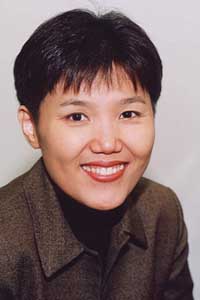Choi to use NIMH grant to study Asian American youth
By William HarmsNews Office
 Yoonsun Choi |
Yoonsun Choi, Assistant Professor in the School of Social Service Administration, has received a five-year grant for nearly $781,000 from the National Institute of Mental Health. Using her NIMH Research Scientist Development Award, Choi will conduct a study titled “Risk Factors for Problem Behaviors of Asian American Youth.”
The issue of behavior problems among Asian American youth is little understood, she said. Some studies report that Asian American youth are more likely to be part of gangs and take part in violence than other groups, while other studies have an opposite finding: that Asian American youth demonstrate unusually healthy adaptation and adjustment.
As a social worker, Choi has witnessed firsthand the difficulty Asian American young people face.
“Asian Americans are always regarded as foreigners. It is not uncommon for someone to remark to an Asian American, ‘you speak very good English,’ even when that person was born in the United States,” she said.
As a social worker, she counseled young people who had difficulty reconciling their ethnic and cultural identities with their American identities. Many felt that discrimination limited their opportunities.
The social problems faced by Asian Americans are usually much more involved than those of other groups because Asian Americans tend not to seek social service help as readily. “By the time we would see them, their problems would be very serious,” Choi said.
Despite those problems, Asian Americans get stereotyped as being model minority members. Opportunities that are -available to other minority groups are not available to Asian Americans because they are not considered disadvantaged.
Up to this point, studies have not adequately reconciled these opposing views, she said.
“The problem could be that the studies done so far are not methodologically sound because they use non-representative samples,” Choi explained. “It could also be that Asian American youth demonstrate a bimodal distribution of outcomes, with notable successes as well as failures.”
In order to examine the topic, Choi will use data from existing surveys, such as the National Longitudinal Study of Adolescent Health, and also collect new data. She intends to interview a wide variety of Korean American young people in Chicago.
“This research will help develop culturally appropriate and more effective intervention approaches to reduce problem behaviors and enhance resiliency among Asian American youth and subgroups within that larger set of young people,” she said.
The project allows her to work with outstanding scholars in the field, including scholars at the University as well as researchers nationally. The University faculty members she will work with are Benjamin Lahey, Professor in Psychiatry; Diane Lauderdale, Associate Professor in Health Studies; Paul Rathouz, Assistant Professor in Health Studies; and Colm O’Muircheartaigh, Professor in the Irving B. Harris Graduate School of Public Policy Studies.
Choi’s research specialties include ethnic minority youth development, ethnic identity and the prevention of problem behaviors, issues related to immigrant/refugee children and families, research methods, and preventive intervention in social work practice.
Choi received a B.A. in 1990 from Ewha University, Seoul, South Korea, in English and education; an M.S.S.W. in 1993 from the University of Texas at Austin; and a Ph.D. in 2001 from the University of Washington, Seattle, in social welfare.
She was a National Institute of Mental Health predoctoral trainee in prevention research and worked at the Social Development Research Group at the University of Washington.
She worked for several years as a clinical social worker, working for ethnic minority youth suffering from severe emotional and/or behavioral problems and their families, children in foster care, mentally ill immigrant adults, and HIV-positive immigrants with limited English proficiency.
![[Chronicle]](/images/sidebar_header_oct06.gif)